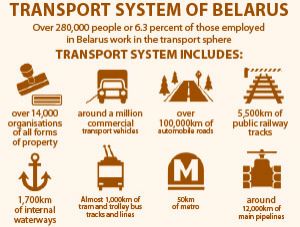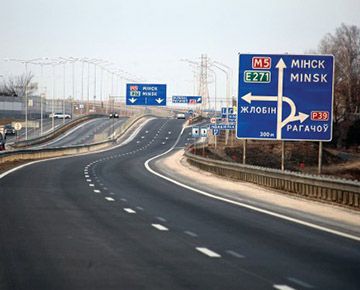
Without exaggeration, the transport industry is the foundation on which the entire economy rests. Accordingly, the state must be directly involved in its development. With thousands of kilometres of communications, and over 10,000 enterprises and organisations (employing over 280,000 people), transport services account for nearly half of Belarus’ service exports.
Mr. Lukashenko seeks honest reporting on the state of the transport industry, including problems faced by transport enterprises and those involved in road construction and maintenance. Most vitally, he wants to know how these problems are being addressed, as monitored by independent experts. “I believe that the Government is failing to tackle these problems,” the Head of State admits, “Since specialists concerned for the transport industry mention problems at transport enterprises.”
Without exaggeration, the transport industry is the foundation on which the entire economy rests. Accordingly, the state must be directly involved in its development.
The President is eager to know how costs are being reduced, while raising the affordability and quality of transport services — for individuals and businesses. “I’m sick and tired of speculation on cross-subsidising having destroyed transport arteries and the transport industry,” notes Mr. Lukashenko. “There is no cross-subsidy: there are tariffs and prices — so use them.”
The President is also interested in difficulties faced by international transportation, particularly across the Eurasian Economic Union, and the degree of success abroad regarding the export of transport services. “Problems have been settled in the transport sphere within the Eurasian Economic Union (and into and from third countries) but I’d like to hear how these difficulties were settled,” the Head of State asserts.
 The transport industry has been adversely affected by unfavourable global trade factors since the second half of 2014 and the situation could worsen this year. Nevertheless, Belarus has managed to preserve and expand its volume of transported cargoes: the major index for the branch. Last year, Belarus compensated for an annual fall in pipeline transport and even achieved growth. Over the first two months of this year, the volume of cargoes transported via the Republic also rose.
The transport industry has been adversely affected by unfavourable global trade factors since the second half of 2014 and the situation could worsen this year. Nevertheless, Belarus has managed to preserve and expand its volume of transported cargoes: the major index for the branch. Last year, Belarus compensated for an annual fall in pipeline transport and even achieved growth. Over the first two months of this year, the volume of cargoes transported via the Republic also rose.
Deputy Prime Minister Anatoly Kalinin has informed journalists of decisions adopted at the session, including a draft project to create a national operator for transport and logistics services. This should eliminate the ‘disconnect’ between trade, customs and other branches, while promoting co-operation with similar companies around the globe, helping reduce costs and ensure speedy cargo transit.
The development of a network of roads is also vital, with Mr. Kalinin noting that it’s necessary to attract more foreign investments, using instruments of public private partnership. Some results are already evident. He underlines, “We’re working with the Eurasian Bank for Reconstruction and Development to attract investments for the Kobrin-Gomel-Russian Federation and Volozhin-Kamenny Log roads. We plan to meet with the EU Commissioner, to discuss ways of co-financing these projects.”
Regarding interaction with partners, foreign operators may help organise internal transit within the Eurasian Economic Union: a joint session of the transport ministries of Belarus and Russia is scheduled for May-June, aiming to solve current challenges.
By Vladimir Mikheev
Photo BELTA
Photo BELTA











